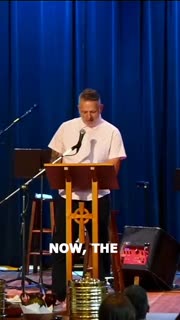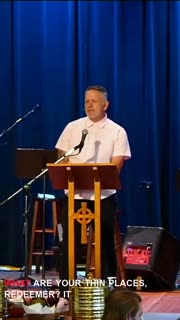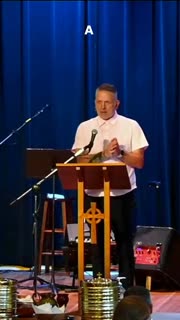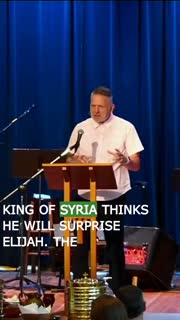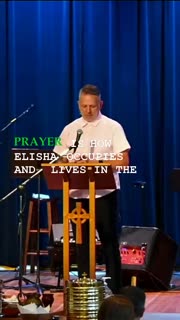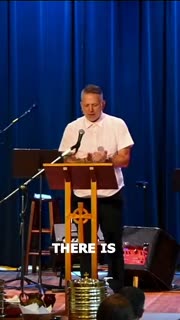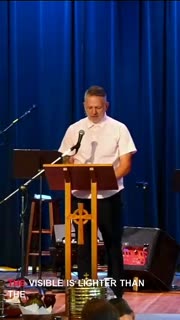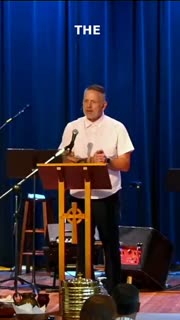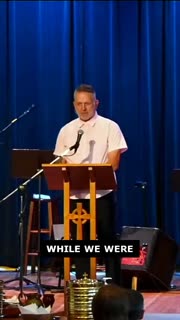Seeing the Unseen: Embracing Spiritual Realities
Devotional
Sermon Summary
Bible Study Guide
Sermon Clips
1. "Now, the Celtics called these moments where the unseen world becomes seen, like that moment in the car, a thin place. A thin place is special, not because the air is rarefied or the land is narrow, but it's almost like the distance between heaven and earth shrinks, like time and eternity seem to embrace." [50:10] (29 seconds)
2. "What are your thin places, Redeemer? It could be a physical place. It could be a moment or a situation. It could be a call. I was thinking about being at Bible school, which I was weirdly very nervous about teaching Bible school this year. I hadn't done that in a long time." [51:14] (19 seconds)
3. "A seer is a person who can see what other people can't see. Like, some of you have people like that in your life. People who see things in you that you can't see, and they speak those things to you and over you." [53:21] (15 seconds)
4. "Elisha sees. He sees what's invisible. This is part of the mantle that Elisha wears as the man of God. It's emphasized in putting it on. Putting on Elijah's mantle, the mantle of the prophet of God. Elijah has the Holy Spirit in such a way that he sees. He sees what's actually there but is invisible to most." [55:22] (24 seconds)
5. "The king of Syria thinks he will surprise Elijah. The one who knows his secrets in his very own bedroom. Oh, the arrogance of the proud and the powerful. We think we can out-know God. We exalt ourselves against God and his kingdom." [56:58] (23 seconds)
6. "Prayer is how Elisha occupies and lives in the thin place to see the thin place and that's kind of the point this morning and we're going to work through this quickly but how do you move from the thick membrane of this world to these thin places? Through prayer." [01:02:47] (18 seconds)
7. "There is something at work in your world that's more real than what you can see. There is a realm overlaid with this one. Separated in most moments by our senses and that realm is more real than this one. It's the eternal realm hidden in the finite." [01:04:54] (24 seconds)
8. "The visible is lighter than the invisible and the visible is gloriously heavier than the visible. If I'm honest with you, I feel like my life has often been one-eyed and short-sighted. I've been squinting seeing life only from the place of my own understanding and what my eyes can see." [01:09:18] (24 seconds)
9. "The table that spread brings peace. When Jesus came into our world when he began his public ministry like rumors started to spread that he was Elijah. And Jesus was quick to point out I'm not Elijah. If anyone was Elijah it was John. John the Baptist his cousin." [01:17:07] (22 seconds)
10. "While we were yet sinners Christ the bread of life gave himself for us. While we were still enemies we were reconciled to God through the death of his son. That's the artillery of heaven. God calls his enemies friends and spreads a great feast before them puts a banner over them and says you were loved. Church go and do likewise." [01:19:59] (30 seconds)
Ask a question about this sermon
2. "What are your thin places, Redeemer? It could be a physical place. It could be a moment or a situation. It could be a call. I was thinking about being at Bible school, which I was weirdly very nervous about teaching Bible school this year. I hadn't done that in a long time." [51:14] (19 seconds)
3. "A seer is a person who can see what other people can't see. Like, some of you have people like that in your life. People who see things in you that you can't see, and they speak those things to you and over you." [53:21] (15 seconds)
4. "Elisha sees. He sees what's invisible. This is part of the mantle that Elisha wears as the man of God. It's emphasized in putting it on. Putting on Elijah's mantle, the mantle of the prophet of God. Elijah has the Holy Spirit in such a way that he sees. He sees what's actually there but is invisible to most." [55:22] (24 seconds)
5. "The king of Syria thinks he will surprise Elijah. The one who knows his secrets in his very own bedroom. Oh, the arrogance of the proud and the powerful. We think we can out-know God. We exalt ourselves against God and his kingdom." [56:58] (23 seconds)
6. "Prayer is how Elisha occupies and lives in the thin place to see the thin place and that's kind of the point this morning and we're going to work through this quickly but how do you move from the thick membrane of this world to these thin places? Through prayer." [01:02:47] (18 seconds)
7. "There is something at work in your world that's more real than what you can see. There is a realm overlaid with this one. Separated in most moments by our senses and that realm is more real than this one. It's the eternal realm hidden in the finite." [01:04:54] (24 seconds)
8. "The visible is lighter than the invisible and the visible is gloriously heavier than the visible. If I'm honest with you, I feel like my life has often been one-eyed and short-sighted. I've been squinting seeing life only from the place of my own understanding and what my eyes can see." [01:09:18] (24 seconds)
9. "The table that spread brings peace. When Jesus came into our world when he began his public ministry like rumors started to spread that he was Elijah. And Jesus was quick to point out I'm not Elijah. If anyone was Elijah it was John. John the Baptist his cousin." [01:17:07] (22 seconds)
10. "While we were yet sinners Christ the bread of life gave himself for us. While we were still enemies we were reconciled to God through the death of his son. That's the artillery of heaven. God calls his enemies friends and spreads a great feast before them puts a banner over them and says you were loved. Church go and do likewise." [01:19:59] (30 seconds)
